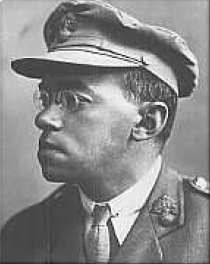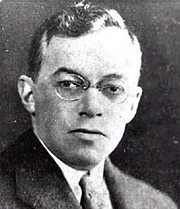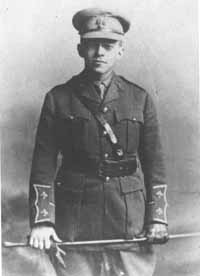Zeev Jabotinsky
|
|
Ze'ev Vladimir (Evgenevich) Jabotinsky (or Zhabotinski) (October 18, 1880 - August 4, 1940) was a Zionist leader, author, orator, and founder of the Jewish Legion in World War I.
During World War II a similar and larger unit known as the Jewish Brigade would follow.
| Contents |
Early life
Born in Odessa, Ukraine, he was raised in a traditional Jewish home and learned Torah, Tanakh, and Hebrew as a child, but as he grew older, he came to identify with the secular Jewish youth of the city.
Education
Jabotinsky's talents as a journalist became apparent even before he finished high school, and upon graduation he was sent to Bern, Switzerland and later to Italy as a reporter for the Russian press. While abroad, he also studied law, but it was only upon his return to Russia that he qualified as an attorney. His dispatches from Italy earned him recognition as one of the brightest young Russian-language journalists: he later edited newspapers in Russian, Yiddish, and Hebrew.
Active Zionist
After the Kishinev pogrom of 1903, Jabotinsky joined the Zionist movement, where he quickly earned a reputation as a talented speaker and leader of the intellectually oriented youth. During that time, he concentrated on learning modern Hebrew as a spoken language. During the ensuing pogroms, he organized self-defense units in the various Jewish communities throughout Russia and struggled for the civil rights of the Jewish population as a whole.
World War One
During World War I, he conceived of the idea of establishing a Jewish Legion to fight alongside the British against the Ottomans who then controlled Palestine. Together with Joseph Trumpeldor, he created the Zion Mule Corps, which consisted of several hundred Jewish men, mainly Russians, who had been exiled from Palestine by the Turks and had settled in Egypt. The unit served with distinction in the Battle of Gallipoli. When the Zion Mule Corps was disbanded, Jabotinsky traveled to London, where he continued in his efforts to establish Jewish units to fight in Palestine as part of the British Army. Only in 1917, however, did the government agree to establish three Jewish units. Jabotinsky himself fought against the Turks in the Jordan Valley in 1918 and was decorated for bravery. One of his main regrets was that the the Jewish soldiers could not participate in even more battle engagements because the British tended to restrain them by keeping the Zion Mule Corps in the background.
Founds the Revisionists
After the war, Jabotinsky was elected to the first legislative assembly in Palestine, and in 1921, he was elected to the executive council of the World Zionist Organization. He quit the latter group in 1923, however, due to differences of opinion between him and its chairman, Chaim Weizmann, and established the new revisionist party called Alliance of Revionists-Zionists and its youth movement, Betar (a Hebrew acronym for the "League of Joseph Trumpeldor"). His new party demanded that the Zionist movement recognize as its objective the establishment of a Jewish state along both banks of the Jordan River. His main goal was to establish a modern Jewish state with the aid of the British Empire. His philosophy contrasted with the socialist oriented Labor Zionists, in that it focused economic and social policy on the ideal of the Jewish Middle class in Europe. An Anglophile, his ideal for a Jewish state was a modern liberal democracy based on the British model. His support base was mostly located in Poland, and his activities focused on attaining British support to help in the development of the Yishuv.
Exiled by the British

In 1929, Jabotinsky left Palestine to attend the Sixteenth Zionist Congress. The British authorities did not allow him to return due to Arab pressure. The movement he established was not a monolithic entity, but contained three separate factions, of which Jabotinsky was the most moderate. Jabotinsky favored cooperation with the British, while more irredentistically-minded individuals like David Raziel, Abba Ahimeir, and Uri Zvi Greenberg focused on independent action in Mandate Palestine, fighting politically against Labor, the British Authorities, and retaliating against Arab attacks. David Raziel was commander of the Irgun, while Abba Ahimeir and Uri Zvi Greenberg acted as visionaries for Lehi. It is the Irgun wing of the Revisionist Party that formed Herut and then Likud by absorbing the centrist General Zionist Party. One of his greatest disciples was Menachem Begin, past leader of the Irgun and Betar faction and future prime minister of Israel.
His legacy
- See: Revisionist Zionism
External link
- The Jabotinsky Institute (http://jabotinsky.org/)he:זאב ז'בוטינסקי


